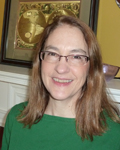2011
Bonnie Costello
- Professor
- Boston University

Abstract
“We” has always been an ambiguous pronoun in English, as its scope and relation to the addressee can only be interpreted in context. The modern age—which emphasized collective ideologies, historical process, and public responsibility over aesthetics and individual consciousness—put new pressures on the art world, and fostered new reflections on voice, audience, and address. These pressures are registered with particular sensitivity in poetry, the genre with the most acute linguistic self-consciousness. While the topic of this study is one two-letter word, its reach is wide. In exploring the rhetoric of the first-person plural, it offers both a broad genre study and a focused historical study, 1930-1945. It also includes close readings of Wallace Stevens, W.H. Auden, and Elizabeth Bishop.

